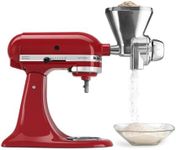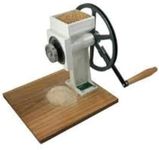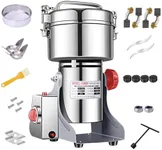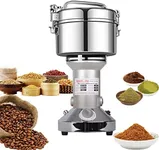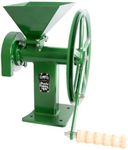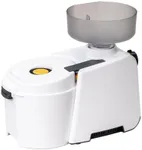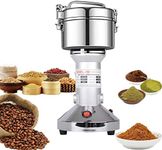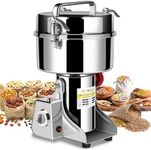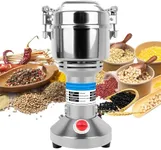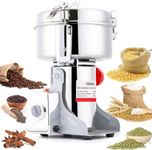Buying Guide for the Best Electric Grain Mills
Choosing the right electric grain mill can significantly impact the quality and efficiency of your grain milling process. Whether you're a home baker, a small-scale farmer, or someone who enjoys making fresh flour, understanding the key specifications of electric grain mills will help you make an informed decision. Here are the main factors to consider when selecting an electric grain mill.PowerPower is measured in watts and indicates the strength of the motor. A higher wattage means the mill can handle tougher grains and larger quantities more efficiently. For home use, a mill with 200-400 watts is usually sufficient. For more intensive use, such as small-scale farming or frequent large batches, look for mills with 500 watts or more. Consider your typical usage to determine the right power level for you.
Grinding CapacityGrinding capacity refers to how much grain the mill can process in a given time, usually measured in pounds per hour. For occasional home use, a capacity of 1-2 pounds per hour is adequate. If you plan to mill larger quantities regularly, look for a mill with a capacity of 5-10 pounds per hour or more. Your choice should align with how much flour you need and how often you plan to use the mill.
Grind SettingsGrind settings determine the fineness or coarseness of the flour. Some mills offer a wide range of settings, allowing you to produce anything from fine flour to coarse meal. If you need versatility for different recipes, choose a mill with multiple grind settings. For those who primarily need one type of flour, a mill with fewer settings may suffice. Think about the types of grains and the consistency you need for your baking or cooking.
Material and Build QualityThe material and build quality affect the durability and longevity of the mill. Mills made from high-quality materials like stainless steel or heavy-duty plastic are more durable and can withstand frequent use. If you plan to use the mill regularly, invest in one with a robust build. For occasional use, a mill with a simpler construction may be adequate. Consider how often you will use the mill and the types of grains you will be milling.
Noise LevelElectric grain mills can be noisy, which might be a concern if you have a quiet household or sensitive ears. Noise levels vary between models, with some mills designed to operate more quietly. If noise is a significant factor for you, look for mills that are specifically marketed as quiet or have user reviews mentioning low noise levels. Think about your tolerance for noise and the environment in which you will be using the mill.
Ease of CleaningEase of cleaning is important for maintaining the mill and ensuring it operates efficiently. Some mills have removable parts that make cleaning easier, while others may require more effort to clean thoroughly. If you value convenience, choose a mill with easy-to-clean features. Consider how much time you are willing to spend on maintenance and how often you will need to clean the mill based on your usage.
Size and StorageThe size of the mill affects where you can store it and how much counter space it will occupy. Compact mills are easier to store and are ideal for smaller kitchens, while larger mills may offer more features but require more space. Think about your kitchen space and storage options when choosing the size of your mill. Ensure it fits comfortably in your designated area without causing inconvenience.

